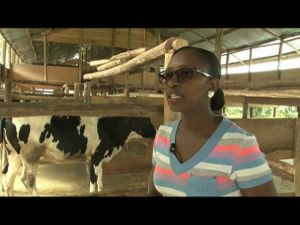Modern farming in Uganda
By Paul Ndiho
Agriculture is Uganda’s most important economic sector, employing over 80 percent of the work force. Now, some of the nation’s small scale farmers are rethinking agriculture, investing in modern farming method that improves productivity 
Agricultural experts say that Africa’s small-scale farmers can play a key role in ending food insecurity on the continent – if they are included in the value chain. Even though there is still a lot to be done to increase both food and cash crop production. This can only be completed through improved agriculture. In Uganda, one small scale farmer is investing in new farming methods. Rebecca Pearl Tumwebaze, is part of this growing community of farmers giving agriculture a second chance. Based in the Mukono district of central Uganda, she’s been able to utilize about 10 arches of land, to practice modern agriculture by raising pigs, dairy cows and chickens.
“All my food comes from here. I pick my banana from my plantation; i get my vegetables here. If you walk around this farm, you’d notice we have all vegetables. We have tomatoes, we have onions, we have greens, we have cabbages, we have green pepper-everything is grown here. And it’s for the reason that we save.”
Like many farmers, Rebecca Pearl is optimistic about the opportunities in agriculture for young people in Uganda. She understands the hard work and commitment it takes to find success, and knows that many young Ugandan’s are instead looking for quick money.
“I got interested in farming because I could see that there’s a chance in farming. If you look at the statistics, the population of Uganda is going up and up and up. We have a lot of the urban population-all these need food. So who is going to provide that food if we all run for the white collar jobs? Well, I decided to start this so I can be able to tap into that market.”
Pearl says that since adopting modern methods, her farm has been able to increase yields and earns her in about 3,500 us dollars a month. Lately, she has started to zero-grazing — genetically improved cows. They’re kept in stalls and fed with fodder cut and carried to them daily.
“The glory with zero grazing is that this cow rests a lot. It sits here, its food is right there…its water is right there. So it is able to drink. And when it drinks, the more it drinks, it is able to rest and its body can form the milk that we want to get from it.”
But she also admits that after noticing the rapidly evolving pork culture in Uganda, she felt the need to take advantage of the potentially huge market for pork and pork products.
Despite the success of orchard farm, Uganda’s agricultural sector faces various challenges, such as traditional cultivation methods, dependence on rain-fed agriculture, limited technological application and low productivity. Rebecca pearl is currently perusing her PhD in business information systems — looking at how to use ICT – To enhance business process, monitoring and decision making among farmers.
Paul Ndiho is a Ugandan – American video journalist/ executive producer, Africa Innovations & Technology based in Washington D.C with interests in innovation, technology and entrepreneurship in Africa. He is passionate about mentorship and developing the next generation of Africa’s young leaders. Email:pndiho@gmail.com, Facebook: Paul Ndiho and Twitter: @pndiho

Wow! What an inspiring story my lecturer and my business mentor has! Very very & very interesting to listen/read about. Thanks and we love here at UTAMU
LikeLike
This is a very inspiring story. Its very encouraging to see women venturing into agriculture and am quitting my job and take up agriculture as my main job. Arnold Zulu from Zambia.
LikeLike
Rebecca that’s very good at least u made it it’s not easy with the weeds mukama mulungi
LikeLike